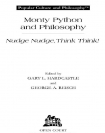Monty Python and Philosophy, Gary Hardcastle [portable ebook reader TXT] 📗

- Author: Gary Hardcastle
Book online «Monty Python and Philosophy, Gary Hardcastle [portable ebook reader TXT] 📗». Author Gary Hardcastle
During this discussion we shall be assisted occasionally by Socrates, the central character in Plato’s dialogues. Though Christianity is a revealed religion, significant aspects of Plato’s philosophy were adapted to Christian theology. There is, however, an important relevant difference. The god Socrates describes in Plato’s most popular dialogue, the Republic, is a rather abstract collection of perfect attributes detached from human affairs. The Christian God, on the other hand, represents the characteristics associated with fatherhood, and His human creations are described as His children. The Christian God is a loving provider and protector, but is also the ultimate authority, taskmaster, and disciplinarian. The Christian God is a personal god, intimately involved in the lives of His subjects. Christian doctrine expresses what it considers the proper relationship of God and human. Despite the kinship between Platonism and Christianity, Plato would probably agree with the Pythons that certain Christian doctrines and practices, when accepted and followed uncritically, reflect poorly on us and God.
In Alphabetical Order: Birth Control (and Other Intimate Matters)
In Monty Python’s The Meaning of Life, a mill worker, played by Michael Palin, sadly announces to his numerous offspring that the mill is closed and there is no work. How will they survive? Palin must sell the children for scientific experiments. “Blame the Catholic Church for not letting me wear one of those little rubber things,” he tells the youngsters. Neither he nor their mother (Terry Jones!) can use contraception if they are to remain Catholic, “part of the fastest growing religion in the world.” He proceeds to explain, in song, what “we believe.”
Every sperm is sacred,
Every sperm is great.
If a sperm is wasted,
God gets quite irate.
Let the heathen spill theirs
On the dusty ground.
God shall make them pay for
Each sperm that can’t be found.
According to this belief, God takes a keen interest in whether or not people have children. Apparently children are the means through which God replenishes his army. The notion that He becomes “quite irate” whenever sperm is “wasted” implies that God insists that people have children even when they can no longer afford to feed them, and will severely punish those who take measures to avoid conception. The alternatives He permits are to cease having sexual intercourse or be swiftly kicked out of the religion.
As Palin’s children reluctantly trudge to the laboratory, a peering neighbor (Graham Chapman) explains to his wife (Eric Idle!) that “as members of the Protestant Reformed Church, which successfully challenged the autocratic power of the papacy in the mid-sixteenth century, we can wear little rubber devices to prevent issue.” In fact, Chapman continues, Martin Luther “may not have realized the full significance of what he was doing,” but the consequences of his actions are that “four hundred years later, thanks to him, my dear, I can wear whatever I want on my John Thomas.”
So the Protestant Reformation was actually about contraception and personal sexual liberation. “That’s what being a Protestant is all about,” Chapman declares, “That’s why it’s the church for me. That’s why it’s the church for anyone who respects the individual and the individual’s right to decide for him or herself.” Protestants and Catholics, whatever their differences, apparently agree that God is very concerned about whether or not a man wears a condom.
This scene illustrates that too much of God’s presence in sexual affairs is likely to, shall we say, take the lead out of the pencil. When Chapman explains that each time Catholics have relations they have to have a baby, Idle does not understand the difference between Catholics and Protestants like themselves, because, “we have two children and we’ve had sexual intercourse twice.” “That’s not the point,” Chapman responds. They could have “it” as much as they want, and furthermore Chapman could purchase products intended to enhance pleasure. Idle’s temperature rises at the prospect, but he soon realizes, probably for the zillionth time, that all this talk about God is cold water on the fire.
This assertion of God’s concern about reproduction suggests that He spends much of His time voyeuristically observing the sexual practices of His human creations. Before you accuse God of perversion, realize that He has little choice but to spy if He is to know which members of His flock are guilty of naughtiness. If the Catholic position is correct, God must watch sexual preliminaries for possible application of contraceptive devices. Even if Chapman’s Protestant viewpoint is right, God still must go “undercover” to monitor copulation for unauthorized positions (any but missionary) and for the proper number of persons (two), sexes (one male and one female)57 and marital status (married) of participants. God must also ensure that couples are not “doing it” too frequently or making too much noise during the proceedings, since these infractions would undermine the dignity and holy purpose of screwing. The Pythons ask us to consider the consequences of the belief that God cares about reproductive practices and sees everything. If so, then he watches our sexual activities. The attractiveness, endowments and skills of a given couple no doubt affects the quality of the viewing experience, but Christians must concede that all things considered, this is one of God’s less onerous responsibilities.
Blasphemy (Name-Calling: With Sticks and Stones to Break Your Bones)
In Monty Python’s Life of Brian





Comments (0)